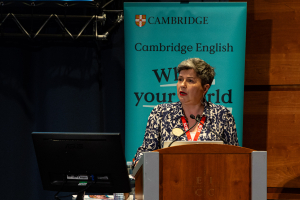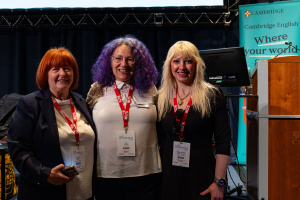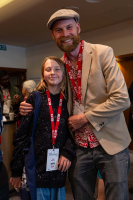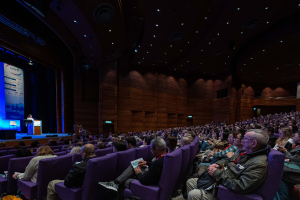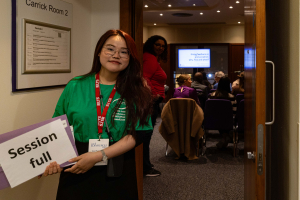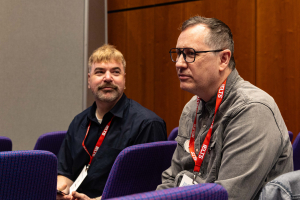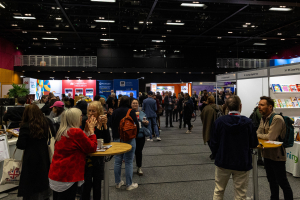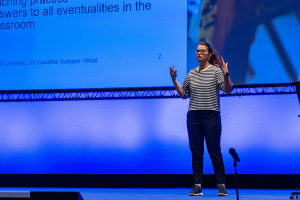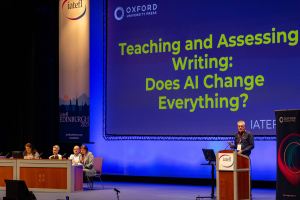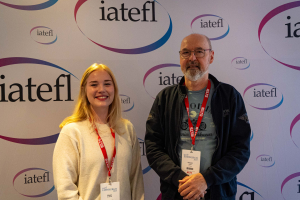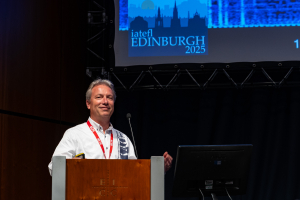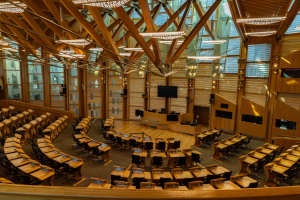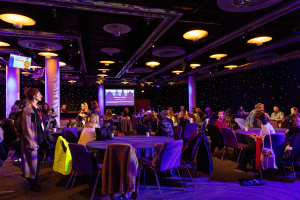IATEFL Edinburgh 2025
- Home
- IATEFL Edinburgh 2025
IATEFL Edinburgh 2025
15/04/2025 - 23:05
The 2025 IATEFL International Conference and Exhibition took place in the impressive capital city of Scotland, Edinburgh. This year, on Monday, April 7, I represented BELTA at the Associates’ Day, which preceded the main IATEFL conference held from Tuesday, April 8 to Friday, April 11, 2025, at the Edinburgh International Conference Centre. Over the course of the four-day conference, more than 500 academic sessions, an exhibition of materials for English language teaching, and a social evening programme were offered to the international community of English language teaching professionals.
For me, IATEFL Edinburgh 2025 began with the Associates’ Day. Delegates from teaching associations worldwide gathered to discuss common challenges and successes. The day was introduced by IATEFL President Aleksandra Popovski Golubovikj and then expertly managed by Jean Theuma, Beatrix Price, and Mirela Cristina Manea Gültekin. The organisers facilitated a SWOT analysis to evaluate our teaching organisations. Although time constraints prevented us from completing it, the exercise provided valuable insights and ideas to take home. Sponsored by Cambridge University Press, the day also included their presentation on CLIL, introducing the 4Cs framework (Content, Communication, Cognition, and Culture). The day concluded with a Welcome Cèilidh, where old friends reunited and new friendships were formed.
The first plenary of the main conference was delivered by Catherine Walter, a former IATEFL President, who reflected on the revolutionary changes in education over the past 50 years. Unsurprisingly, technology was one of the topics, and many talks during the conference focused indeed on AI, emphasizing that teachers remain crucial and preferred over AI teaching. Think about the orphaned monkey who prefers the fluffy surrogate mother over the wired surrogate mother, which it only approaches for food. However, AI offers enormous possibilities and is here to stay. Catherine also highlighted the growing attention to neurodivergent students, advancements in language studies, differentiation, continuous professional development, and the use of native languages in teaching. The plenary was packed with insights, yet too short to cover all the changes.
The conference programme was diverse, featuring a variety of speakers and topics. My first session on pronunciation was unfortunately full, but luckily, there were enough alternatives. That day, I was particularly impressed by the testimonies of Palestinian teachers. In Gaza, they continue teaching in private houses to students aged 9 to 17. What do you teach such a heterogeneous group? They use storytelling to engage them all, allowing them to discuss culture in English classes. I plan to use some of the poems that resulted from these classes with my own students. Additionally, in another session, I gained inspiration to incorporate Sherlock Holmes into my lessons.
On the second day, Carolina Kuepper-Tetzel, a cognitive psychologist, delivered a plenary on effective study strategies based on Herman Ebbinghaus's theories. She explained how spaced practice yields better results than cramming short bits spread over a period of time. Back in class, I will surprise my students with these findings. I also attended sessions on improving speaking skills, transition skills, and pedagogical skills in online EAP instruction.
The following day, Daniel Xerri's plenary on classroom research emphasized its benefits for teachers, though it lacked concrete examples. In the afternoon, BELTA member Bruno Leys presented the much-appreciated talk "What’s the Frequency, Kenneth," encouraging attendees to focus on authentic English usage and to become "crap detectors." The previous day, Eric Nicaise, another Belgian, had presented "I Cycled Across the UK, and I Teach Culture." Here, I faced the frustration of choosing one talk at the expense of another. Afterwards, I heard very positive comments. Both Eric and Bruno will present on BELTA Day. In the meantime, Dries Debackere, also presenting at BELTA Day, was busy gathering information for his talk “Learnings from IATEFL 2025”. I should not forget two other special BELTA members who attended the conference: Megan De Rouck and Jacques Henet, the BELTA winners of the Joris De Roy Memorial Grant 2024.
The final day began with Neil McMillan's plenary on task-based language teaching, arguing that it has been overshadowed by commercial goals but remains essential. He questioned whether students truly want to write emails about their plans in Edinburgh, noting that teenagers no longer write emails.
For the first time in IATEFL history, the conference concluded with a plenary by a teenager. Young environmental activist Ali Waters asked her father, Harry Waters, five burning questions about education. Together, they discussed the future of education and its connection to real life, finding students' passions, ensuring their well-being, encouraging critical thinking, and stimulating creativity. Harry Waters answered his daughter's questions as best as he could. I am convinced that many sessions provided attendees with inspiration to help fulfil the wishes of the Alis in our classes.
The conference was inspiring, and the city showed its brightest side. We didn’t see a drop of rain, and that for Scotland! Edinburgh is a vibrant city, offering numerous attractions such as the castle, museums, the Scottish Parliament, Holyrood Palace, the Royal Mile, guided walks, and pubs. Nature is never far away, with Holyrood Park and its walking path up to Arthur’s Seat providing magnificent views. The extra activities during the conference offered a glimpse of what this lovely capital has to offer for future visits.


